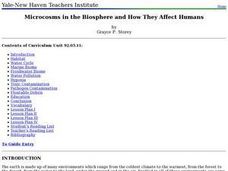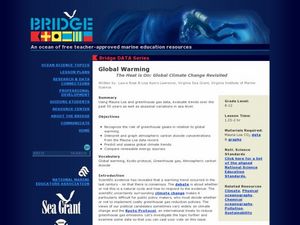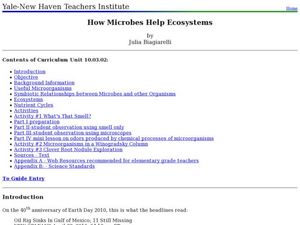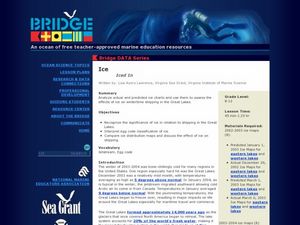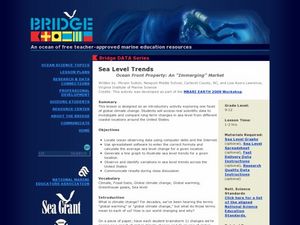NOAA
Fishy Deep-sea Designs!
Oceans represent more than 80 percent of all habitats, yet we know less about them than most other habitats on the planet. The instructor introduces the epipelagic, mesopelagic, bathypelagic, twilight, and midnight zones in the ocean....
Curated OER
Tides - The Ins and Outs of Tides
Get your junior oceanographers to generate tidal prediction graphs on an interactive website. They will feel like experts in the field, or shall we say, experts in the ocean! This is a brief, but worthwhile activity that could be used to...
Florida International University
The Good, the Bad and the Nasty Tasting
Examine the benefits of chemical defense mechanisms. Organisms in oceans use chemicals to ward off predators. Duplicate this adaptation using a hands-on experiment in which you ward off your predators (your pupils) with some bad-tasting...
Curated OER
Conductivity - Pass the Buoy and Pepper, Please
Buoys around our coastlines are equipped with sensory devices which monitor temperature, salinity, and water pressure. Emerging earth scientists examine some of this data and relate salinity to the electrical conductivity of the surface...
Curated OER
Winter Wonderland - Winter Olympics and the Water Cycle
After a concise introduction to the water cycle, junior meteorologists access NOAA's average snowfall data. They choose a city to examine in terms of precipitation. Then they look at historical snowfall data and use it to predict snow...
Curated OER
El Niño ~ The Return of El Niño
El Niño sure creates a stir when it comes around! Why not stir up your earth science class with this data analysis activity that examines the temperature and precipitation over the 2002-2003 water year. A tracking chart is provided...
Curated OER
Ozone Hole - Changes in the Stratosphere
Halting the depletion of the hole in the ozone layer has been one of humanity's happy recoveries from previous damage done to the environment. Meteorology masters muse the Montreal Protocol and examine data on changes in the ozone....
Curated OER
Invasives and Macroinvertebrates
Students view macroinvertebrates, or discuss previous collection activity. They graph data on macroinvertebrates in the Hudson River. Students discuss the relationship between habitat, environmental changes, and invertebrate diversity or...
Curated OER
Science: Microcosms in the Biosphere
In a series of lessons, examine the impact on humans by microcosms in the biosphere. Among the plans structured for young scholars with different abilities and learning styles, are activities describing the symbiotic relationship,...
Curated OER
Raw Seafood ~ On the Half Shell
The topic is fascinating, but there is not much for learners to do here. Food borne illness has always been a problem for humans to face, and here, data from the Center for Disease Control is analyzed. Learners look at the number of...
Curated OER
Global Warming - The Heat is On: Global Climate Change Revisited
After listening to your lecture on climate change, young scientists access NOAA's database listing Mauna Loa's carbon dioxide data. They graph the monthly means and then compare their graphs to NOAA's. This is a concise plan that could...
Bridge
Mercury - Mercury is Rising
Hold a discussion in your class about the increase in mercury being found in fish that are caught commercially as food for humans. Given a worksheet, learners then calculate how much fish a person can safely eat each month to remain...
Curated OER
Water Will, Water Way
Students complete a unit on biodiversity and their significance to pharmaceuticals. They
Curated OER
To Culture or Not to Culture
Students study the pros and cons of the aquaculture industry after reading hypothetical case study. They simulate a town meeting debate about aquaculture.
Curated OER
Surface Tension Grabbers
Students use the following quick activities to comprehend what surface tension is: 1. Fill a gas bottle with water. Place an uncentered burner screen over the bottle. Hold the screen in place with your finger and invert the bottle on...
Curated OER
Depth Line
Students use adding machine tape to plot increasing ocean depths and deep sea historical events.
Curated OER
Sea Urchin Embryology
Learners explore the process of evolution. They examine examples of how homeotic genes may work and obtain gametes. Using a microscope, students observe the fertilization of sea urchins. They video tape the process and write a...
Curated OER
Journey to the Unknown
Young scholars explore the ocean depths. In this scenario based lesson, students pretend they are on a submarine in an unknown part of the ocean. By using clues the class discusses and determines where they are in the ocean. They follow...
Curated OER
How Microbes Help Ecosystems
Sixth graders observe different microorganisms under the microscope. In this biology lesson, 6th graders draw and describe the samples they see. They study the root nodules of plants and explain how the plants benefit from those bacteria.
Curated OER
Iced In
Introduce junior oceanographers to ice conditions in The Great Lakes. The ice map links are no longer available, so you will not be able to have your class perform the mentioned data activity. You can, however, access the Canadian Ice...
Curated OER
Sea Level Trends ~ Ocean Front Property: An "Immerging" Market
Young oceanographers take a look at sea level data from several cities over a few centuries. They use the data to fuel a discussion about what kind of changes are taking place and the impact they are having on the coastal ecosystems....
Curated OER
The Environments of Big Sur:Which Do We Protect?
Students examine the California environments. In this environmental lesson, students examine the various ecosystems of California, creating a presentation on how these environments impact Big Sur. They write a paper defending their point...
Curated OER
Using Maps to Make Public Health Descisions Case Study: Harmful Algal Blooms in the Gulf of Mexico
Students are introduced to GIS and its uses. Students participate as public health scientists to deliberate a course of action to explore possible research questions. Pupils interpret spatial data, and make predictions based on GIS data,...
Curated OER
Waves : An Alternative Energy Source
Young scholars evaluate the feasibility of wave energy as an alternative source of energy. In this alternative energy source lesson students are introduced to renewable and nonrenewable energy and study energy production.










